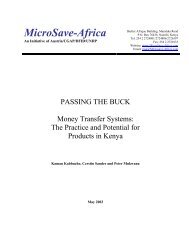Create successful ePaper yourself
Turn your PDF publications into a flip-book with our unique Google optimized e-Paper software.
in the forefront, serving an unprecedented six<br />
<strong>years</strong> as Chief <strong>of</strong> Party and gaining praise from<br />
all quarters for the project’s excellent results. He<br />
managed a diverse team, incorporating subsector<br />
analysis methods that had been refined by<br />
Bill Grant and Boomgard’s other GEMINI colleagues,<br />
and tapping industry experts from the<br />
United States and partners from the Moroccan<br />
private sector. Together, they coaxed efficiencies<br />
out <strong>of</strong> every step <strong>of</strong> the production chain.<br />
Reflecting the shift in emphasis from agriculture<br />
for subsistence to production for export,<br />
the MAPP team worked hard to get Moroccan<br />
products into foreign markets. At the June<br />
1998 seminar that wrapped up the project, one<br />
USAID <strong>of</strong>ficial noted that “MAPP has shown<br />
how public and private cooperation in agribusiness<br />
can succeed.”<br />
Technical assistance was something <strong>DAI</strong> knew<br />
a great deal about. In 1989, distinguished development<br />
economist Elliot Berg had signed on as<br />
<strong>DAI</strong>’s Vice President for Policy and Research. In<br />
1993, assisted by Craig Olson, Berg authored<br />
an influential book for the United Nations Development<br />
Programme (UNDP) called Rethinking<br />
Technical Cooperation. The book documented<br />
the uneven track record <strong>of</strong> donor-financed technical<br />
assistance projects in Africa. It sparked<br />
some controversy with its findings, which<br />
showed that much technical assistance was being<br />
supplied by donors without evidence <strong>of</strong> real<br />
demand from African governments. The clients<br />
at UNDP got cold feet after the book’s provocative<br />
findings gained critical notice. Mickelwait,<br />
who had been instrumental in attracting Berg to<br />
join <strong>DAI</strong>, quipped to his colleague: “Elliot, your<br />
book could put us out <strong>of</strong> business … but if it’s<br />
only in Africa, I can live with that.” (Mickelwait’s<br />
enthusiasm for Southeast Asia and lack <strong>of</strong> interest<br />
in Africa, Barclay’s “turf,” was a standing<br />
joke in the firm.) But he was proud <strong>of</strong> the solid<br />
analysis that forced <strong>DAI</strong>’s clients and a wider<br />
readership to reconsider conventional wisdom<br />
and traditional development approaches, and<br />
<strong>DAI</strong> suffered no adverse consequences from the<br />
study.<br />
Agriculture also led <strong>DAI</strong> onto the front lines <strong>of</strong><br />
the international drug war, as it took on projects<br />
aimed at promoting “alternative livelihoods”<br />
for peasant farmers producing coca or opium<br />
poppy. The firm gained some experience from<br />
early experiments in Pakistan’s Northwest<br />
Frontier Province in the 1980s, followed by a<br />
Pakistan-based project to manage cross-border<br />
activities in Afghanistan after Soviet troops<br />
Don Humpal, now<br />
a 30-year <strong>DAI</strong><br />
veteran, led the<br />
flagship Moroccan<br />
Agribusiness<br />
Promotion Project.<br />
57



